Every day, the average adult inhales approximately 11,000 liters of air. While getting outside and breathing in fresh air has numerous health benefits, the reality is that not all air is good for you.
Airborne pollutants are one of the greatest sources of toxic exposure known to humankind and have a significant impact on human health. According to one estimate from the World Health Organization, air pollution contributes to seven million premature deaths around the world every year.
The air pollution emitted by cigarettes is ten times greater than that of a diesel car exhaust, according to a controlled experiment reported by Tobacco Control.
The dangers of smoking cigarettes are well publicized. But while quitting smoking is a straightforward way to reduce exposure to toxins and improve overall health, it is less easy to avoid exposure to the many toxins that pollute the indoor and outdoor air we breathe every day. Whether you’re a smoker or not.
Air quality varies significantly around the globe, and in many parts of the world, the negative health effects of poor air quality are equivalent to smoking hundreds of cigarettes a year. To better communicate the health risks of air pollution, HouseFresh calculated the number of cigarettes people around the world are indirectly smoking due to poor air quality.
To determine the number of cigarettes people around the world are indirectly smoking due to poor air quality, HouseFresh reviewed data on average PM2.5 concentrations in cities worldwide from AQICN.org and converted it to the equivalent number of cigarettes passively smoked per year in terms of negative health effects using a formula from Berkeley Earth.
One of the main air pollutants measured is PM2.5, or particles smaller than 2.5 microns. Berkeley’s Earth describes a rule-of-thumb that compares exposure to PM2.5 particles to cigarettes smoked: one cigarette per day is the rough equivalent of a PM2.5 level of 22 µg/m3.
We took the average daily median AQI PM2.5 during 2022 as the average AQI PM2.5 in the city. We converted that value to cigarettes as per Berkeley’s Earth rule-of-thumb and multiplied the result by 365 to obtain how many cigarettes you’ve indirectly smoked during a year.
Key findings
- Many of the cities with the worst air quality are in developing economies in the Middle East, Southeast Asia and Africa.
- Dhaka, Bangladesh, has the worst air pollution of any capital city.
- Bern, Switzerland, has the cleanest air of any capital city in the world.
- In California, air pollution due to wildfires and vehicle emissions can offset the positive health effects of low smoking incidence.
Dhaka, Bangladesh, has the dirtiest air of any capital city
Many of the cities with the worst air pollution are in developing countries. In Dhaka, Bangladesh, for example, residents indirectly smoke the equivalent of 1,176 cigarettes a year due to poor air quality — the most of any capital city. Some of the primary contributors to air pollution in Bangladesh include vehicular emissions from cars that run on diesel, industrial fumes from factories and brick kilns.
Bangladesh also has a relative lack of regulations concerning air pollution compared to other countries. According to the Air Quality Life Index (AQLI) study conducted by the Energy Policy Institute at the University of Chicago, Bangladesh has ranked as the country with the world’s worst air pollution every year since 2018 — an issue that reduces life expectancy in the country by 6.7 years.
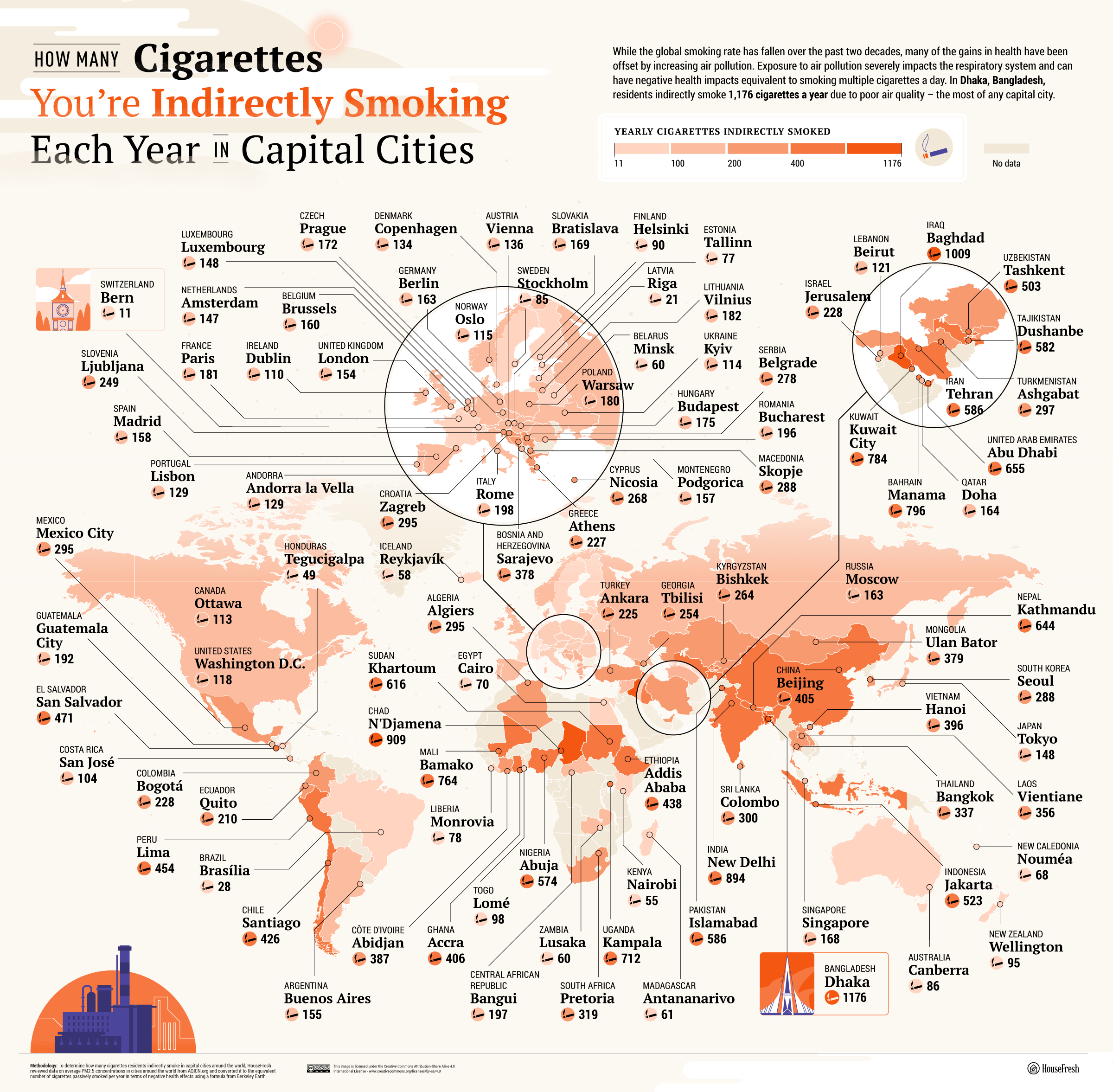
Many of the other cities with the worst air pollution are in the Middle East and Southeast Asia. In Iraq, for example, the brick, cement and oil industries, as well as agricultural fires, dust dorms and domestic energy generation contribute to some of the dirtiest air in the world. In Baghdad, residents indirectly smoke the equivalent of 1,009 cigarettes every year due to poor air quality, the second most of any city worldwide.
The Middle East and Southeast Asia struggle with air quality
While the Middle East has long been predisposed to poor air quality due to desert dust and local climatic conditions, recent research has revealed that the bulk of the region’s poor air quality is due to industrial sources like marine traffic and petrochemical production. The combination creates some of the worst air quality in the world, with devastating effects on the respiratory health of area inhabitants. Some of the cities with the worst air quality in the Middle East include Baghdad, Iraq; Manama, Bahrain; Kuwait City, Kuwait; Abu Dhabi, United Arab Emirates; and Tehran, Iran.
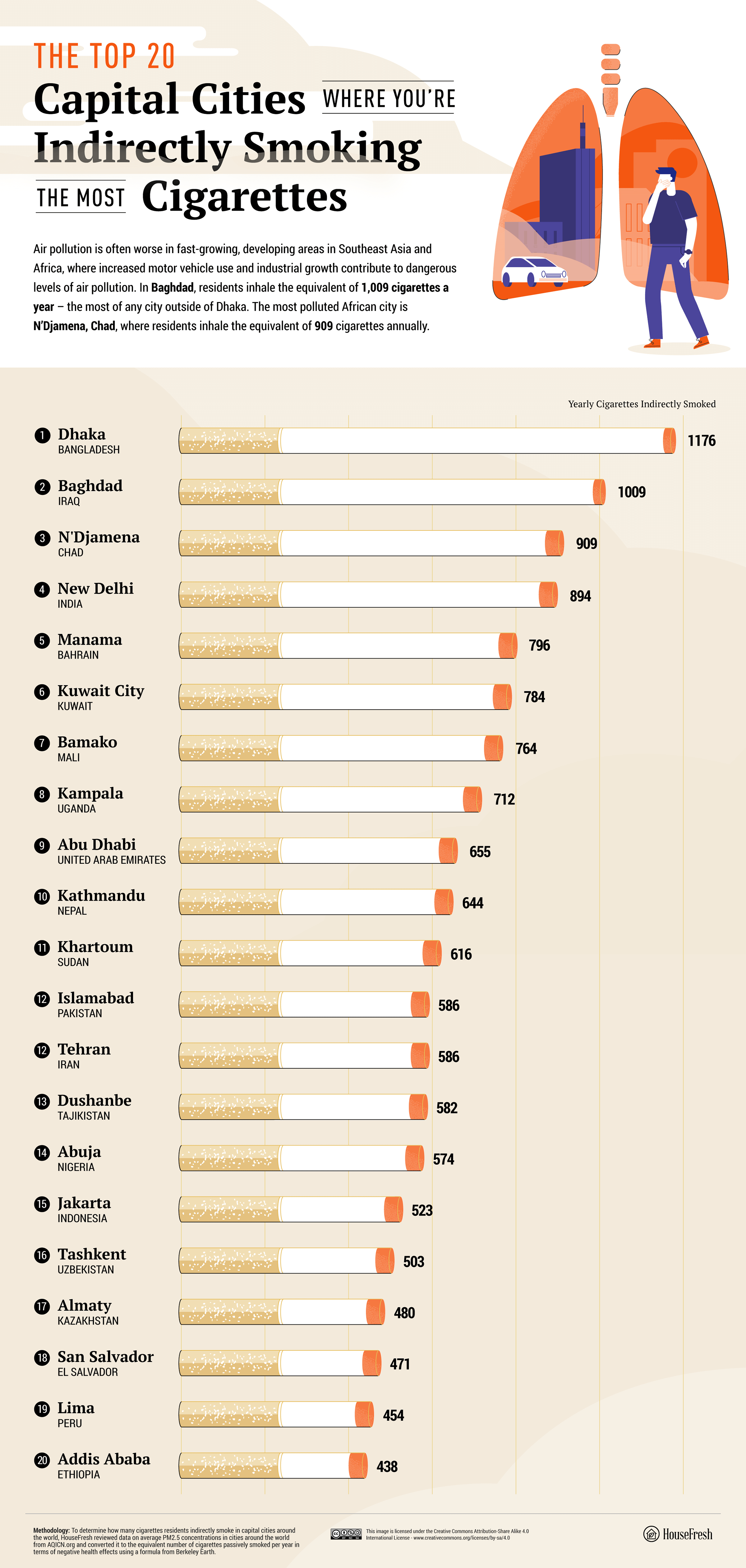
Outside of the Middle East, the most polluted cities are in Southeast Asia and Africa. In Africa, the most polluted capital cities include N’Djamena, Chad; Bamako, Mali; Kampala, Uganda; and Khartoum, Sudan.
Smog and dirty air offset healthy behaviors in California
By a number of measures, California is one of the healthiest states in the country. Just 10.0% of adults smoke —± the smallest share of any state other than Utah — and 78.8% of adults are physically active, also one of the smallest shares nationwide. Many of the positive effects of healthy behaviors in California, however, are offset by the state’s poor air quality.
In Los Angeles, residents inhale the equivalent of 193 cigarettes a year due to poor air quality, the most of any city in the United States. In San Diego, residents inhale the equivalent of 163 cigarettes every year, the second most of any city. Some of the primary contributors to poor air quality in California include oil production, agriculture production and intense wildfires.

Traveling north up the West Coast, however, could spare a Southern California resident the equivalent of dozens of cigarettes smoked due to poor air quality every year. In Seattle, for example, residents smoke the equivalent of 100 cigarettes each year due to air pollution, far less than in Los Angeles or San Diego. In nearby Portland, residents inhale the equivalent of 79 cigarettes a year, the least of any major city in the mainland United States.
South East England has the dirtiest air in the UK
While air quality in the United Kingdom has improved since the Great Smog of London enveloped the capital city in a dense, dangerous layer of coal smoke in 1952, some parts of the country are far worse than others. In general, the highest concentrations of toxic particulate matter are located in the southeast part of the country, while the lowest are in Northern England and Scotland.
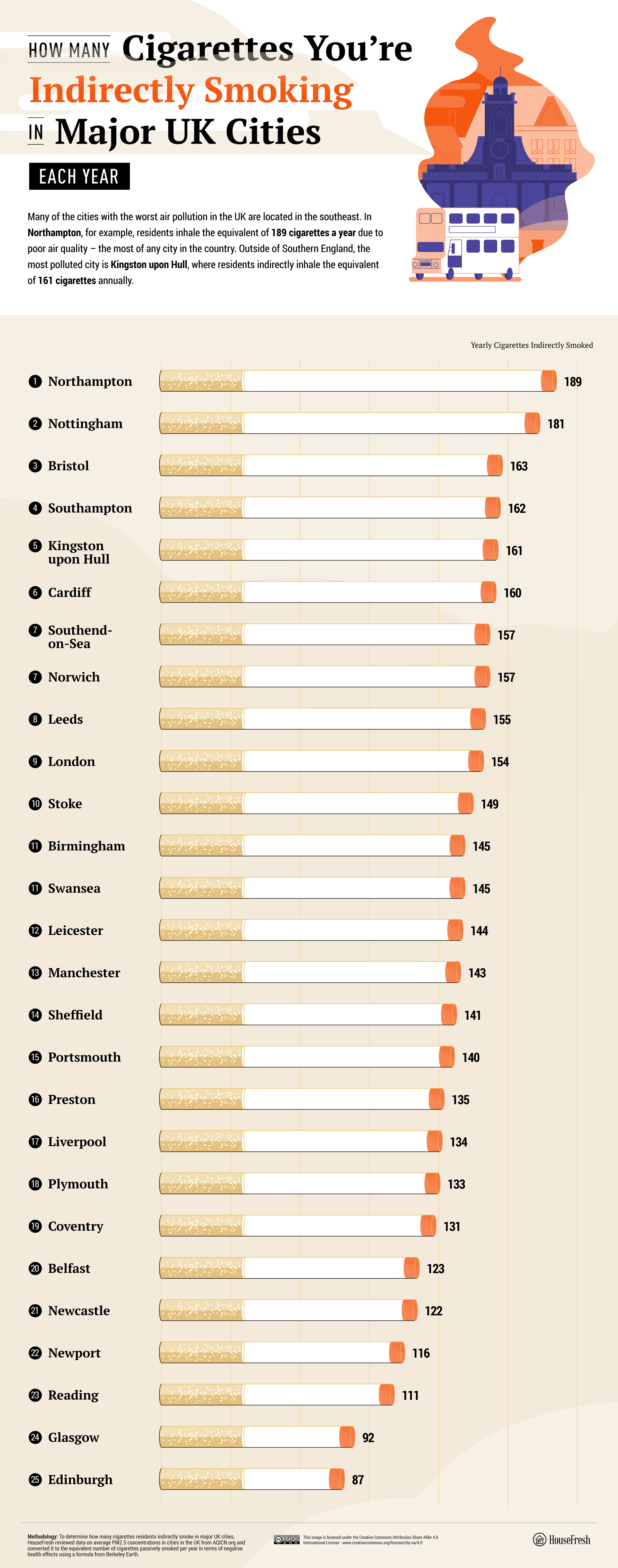
The variance in air quality across the UK can mean the difference of the equivalent of hundreds of cigarettes smoked each year. Moving from Northampton, for example, to Edinburgh would reduce the number of cigarettes smoked due to air pollution every year by more than 100 — taking the number from the equivalent of 189 cigarettes per year to a much smaller 87. According to one study by the British Heart Foundation, approximately one in every 20 deaths in Northampton can be linked to air pollution.
Montréal has the dirtiest air in Canada
While, as a whole, Canada has some of the best air quality in the world, wildfires in the western part of the country and northern Ontario, as well as industrial emissions, wood burning and energy production cause air quality to vary significantly across the nation.
Many of the cities with the worst air pollution in Canada are in the Prairie Provinces and Quebec, along the U.S. border. But home to the dirtiest air of all, is Montréal. According to the City of Montréal, while the bulk of pollution in the municipality comes from vehicle emissions, in the winter, pollution from domestic wood-burning appliances can cause thick layers of smog to cover the city. On average, Montréal residents smoke the equivalent of 124 cigarettes every year due to air pollution, the most of any Canadian city.
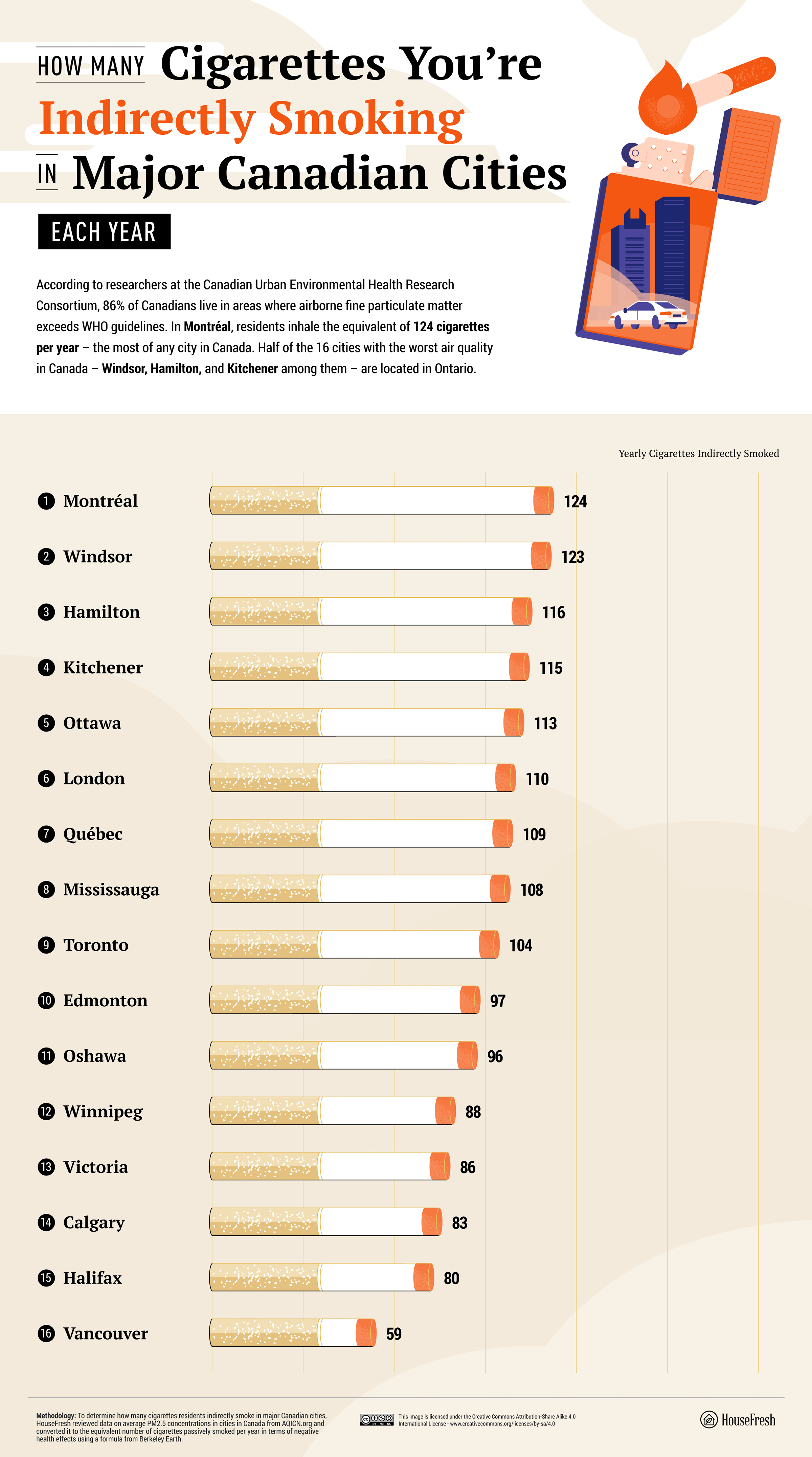
While cities generally have worse air pollution than rural areas, there are some major cities along Canada’s coasts where the respiratory effects of poor air quality are relatively negligible. In Halifax, for example, residents smoke the equivalent of 80 cigarettes a year due to poor air quality — far less than in most Canadian cities. In Vancouver, residents smoke the equivalent of just 59 cigarettes a year due to poor air quality – less than half that of Montréal and the least of any major city nationwide.
Australian wildfires contribute to air pollution
Compared to the rest of the world, Australia has some of the cleanest air of any country. Still, due to increased urbanization, wood-burning heaters and — more recently — wildfires, some parts of Australia have relatively dangerous levels of air pollution.
In Darwin, the capital of Australia’s Northern Territory, pollution is exacerbated by savanna burning projects and wildfires sparked by invasive flammable grasses. Residents of Darwin indirectly smoke the equivalent of 133 cigarettes per year due to poor air quality, the most of any city in Australia.
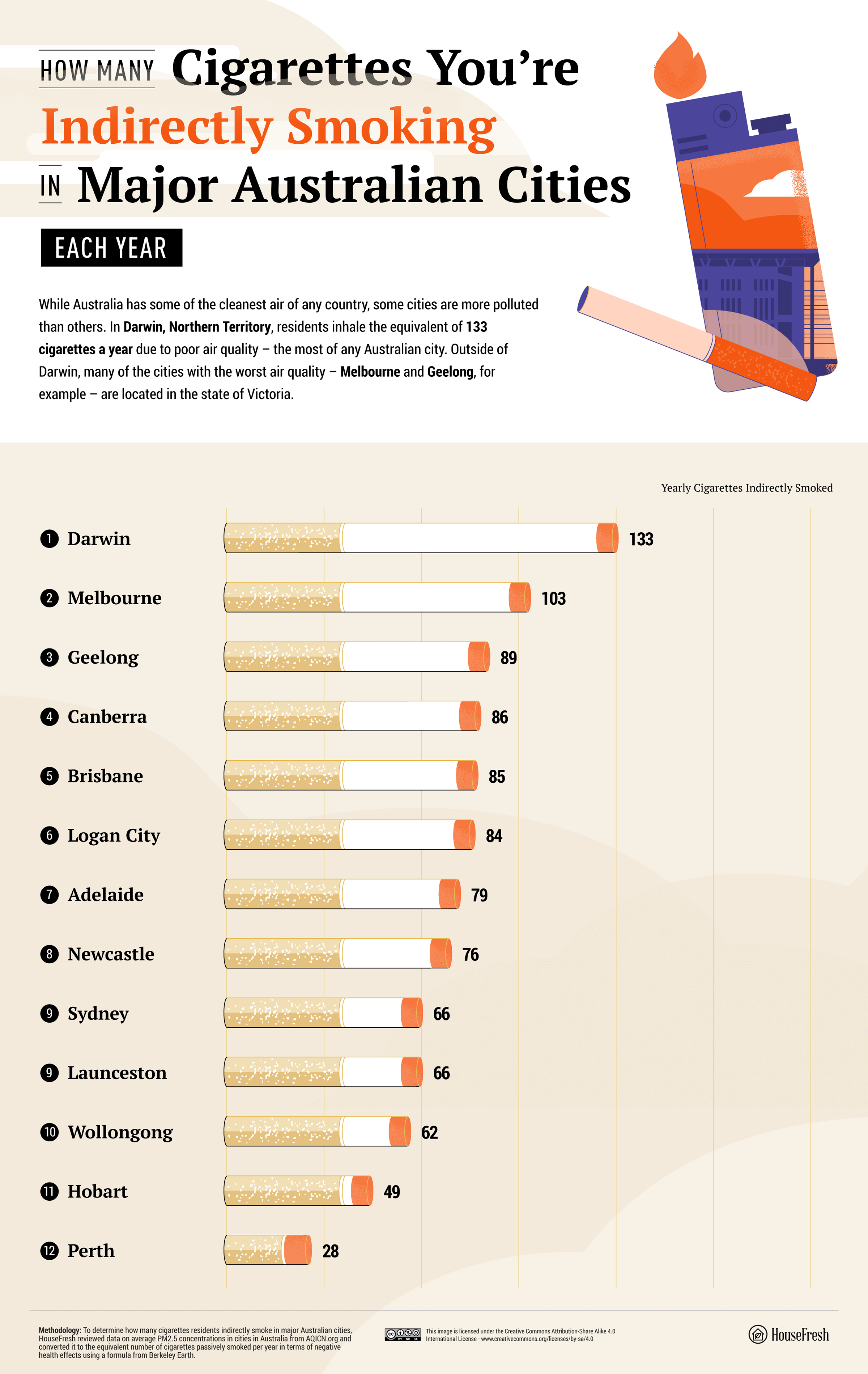
A majority of cities in Australia, however, rank among the healthiest for air pollution on a global scale. In Sydney, Australia’s largest city, residents inhale the equivalent of just 66 cigarettes – among the least of any major city worldwide. Other cities in New South Wales and Tasmania – Wollongong, Launceston and Hobart — also have some of the cleanest air on the continent. In Perth, residents inhale the equivalent of just 28 cigarettes annually due to poor air quality — just one-fifth the amount residents indirectly smoke each year in Darwin and the least of any city in Australia.
Air quality varies significantly from city to city
The difference in where you live can be the difference of thousands of cigarettes smoked over a lifetime. In Bern, Switzerland, for example, air pollution contributes to the equivalent of just 11 cigarettes smoked each year — less than one one-hundredth of the cigarettes smoked indirectly due to air pollution in Dhaka, Bangladesh.
Most of the capital cities with the best air quality are in wealthy, developed European countries with service-oriented economies and strict emissions regulations. And while Africa is home to some of the worst air quality in the world, Kenya is home to some of the cleanest air of any country. In the capital city of Nairobi, residents inhale the equivalent of just 55 cigarettes a year due to poor air quality — nearly the list of any capital city worldwide.
Falling smoking rates, rising emissions
While the decline in smoking over the last 20 years has been one of the great public health achievements of the 21st century, worsening air pollution has offset many of the gains that falling smoking incidence has had on general respiratory health. Due to increased wildfires, rising vehicle and industrial emissions, and domestic wood-burning appliances, living in some of the world’s most populous cities can have the equivalent effect of smoking hundreds of cigarettes a year.
Many of the cities with the worst air pollution are in fast-growing, developing economies, while the cities with the cleanest air are wealthier cities in service-oriented economies.
Air pollution is one of the greatest threats to human health in the world and kills more people each year than tobacco, car accidents or diabetes. Respiratory health has become a major focus in public health since the COVID-19 pandemic, and smoking rates have fallen considerably over the past several decades.
For a complete picture of health, however, it is important to know the respiratory impacts of the air we breathe every day. Do you know how many cigarettes you are indirectly smoking due to air pollution?
METHODOLOGY
To determine the number of cigarettes people around the world are indirectly smoking due to poor air quality, HouseFresh reviewed data on average PM2.5 concentrations in cities worldwide from AQICN.org and converted it to the equivalent number of cigarettes passively smoked per year in terms of negative health effects using a formula from Berkeley Earth.
AQICN.org presents data from cities around the world where different air quality measurements are taken. One of the main air pollutants measured is PM2.5, or particles smaller than 2.5 microns. Berkeley’s Earth describes a rule-of-thumb that compares exposure to PM2.5 particles to cigarettes smoked: one cigarette per day is the rough equivalent of a PM2.5 level of 22 µg/m3.
With this equivalence in mind, we collected AQI PM2.5 data from 2022 for each country’s capital city and converted the index to PM2.5 concentration. We repeated the process for major cities in the US, UK, Australia and Canada.
Each city data comes either from aqicn.org’s COVID-19 dataset (which compiles the daily median air pollutant levels based on various air quality stations in each city) or from the most centrical air quality station available. We discarded cities where the closest air quality station was outside of the city or metropolitan area. Also, stations with few registries for 2022 were discarded.
We took the average daily median AQI PM2.5 during 2022 as the average AQI PM2.5 in the city. We converted that value to cigarettes as per Berkeley’s Earth rule-of-thumb and multiplied the result by 365 to obtain how many cigarettes you’ve indirectly smoked during a year.





